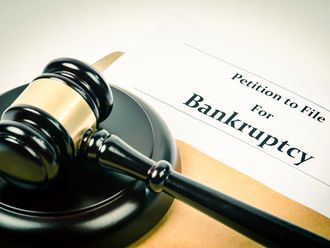New York: The Dow Jones industrial average finished down 585 points on a day of massive swings.
Markets Data: To keep up to date with global markets, go to our commodities, and equities data page.
The U.S. stock market took investors on a stomach-churning ride Monday, as the Dow Jones industrial average briefly plunged more than 1,000 points and sent a shiver of fear from Wall Street to Main Street.
Stocks regained much of that ground as the day wore on. But the slump - part of a global wave of selling triggered by the slowdown in China - reflected uncertainty among investors over where to put their money when the world's second-largest economy is in a slide.
"What's a company that's doing business with China actually worth right now? When you're not sure, you tend to sell," said JJ Kinahan, TD Ameritrade's chief strategist.
The Standard & Poor's 500 index also fell sharply shortly after the opening bell, entering "correction" territory - Wall Street jargon for a drop of 10 percent or more from a recent peak. The last market correction was nearly four years ago.
U.S. treasury securities surged as investors bought less risky assets. Oil prices fell. But investors also saw opportunity, moving fast and early to snap up some bargains. That helped trim some of the market's earlier losses.
The Dow closed 588 pointsd down. The S&P 500 was down 73 points, or 3.7 percent, at 1,897. The Nasdaq composite had shed 162 points, or 3.5 percent, at 4,543 points. The three indexes are down for the year.
"There is a lot of fear in the markets," said Bernard Aw, market strategist at IG.
The sell-off triggered worries in corporate boardrooms, in government capitals and among ordinary Americans young and old who have been saving for retirement or a down payment on a house.
Heightened concern about a slowdown in China had already shaken markets around the world on Friday, driving the U.S. stock market sharply lower. The rout continued Monday as China's main stock index sank 8.5 percent.
Downward pressure
Middle East stock markets remained under downward pressure on Monday as oil prices hit fresh 6-1/2 year lows and Asian bourses slumped in what one Japanese analyst likened to the 1997 Asian financial crisis.
By some technical measures, major Gulf markets are very oversold for the short term and ripe for a rebound.
With an average forward price/earnings ratio of near 11 times, the UAE markets are attractively valued in historical terms. Even Saudi Arabia no longer looks expensive.
But the depth of the global market slide will make it hard for investors to buy back Gulf stocks with any conviction.
MSCI's broadest index of Asia-Pacific shares outside Japan is down about 5 percent in Monday trade and S&P 500 mini futures suggest Wall Street will open sharply lower.
"Markets are panicking. Things are starting to look like the Asian financial crisis in the late 1990s. Speculators are selling assets that seem the most vulnerable," said Takako Masai, head of research at Shinsei Bank in Tokyo.
In a massive sell-off, more than €400 billion had been wiped off the value of the 400 largest companies in Europe on Monday as the market plunged.
Brent oil is down 2.1 percent to $44.52 a barrel, which may trigger fresh rises in U.S. dollar/Saudi Arabian riyal forwards and Saudi credit default swaps, adding to the jitters in Riyad's bourse.
Egypt lowered its top tax rate and the threshold for companies and individuals in high income brackets on Sunday and suspended a 10 percent tax on capital gains.
The measures had previously been announced but the fact that the government has finally gone ahead with them is likely to be seen as positive by investors, who had been concerned by the slow pace of reforms.
However, the news may for now fail to trigger any rally in Cairo given the poor global backdrop and worries that sliding markets in the Gulf may hurt Egypt's trade, investment and aid ties with the region.
Markets Data: To keep up to date with global markets, go to our commodities, and equities data page.












